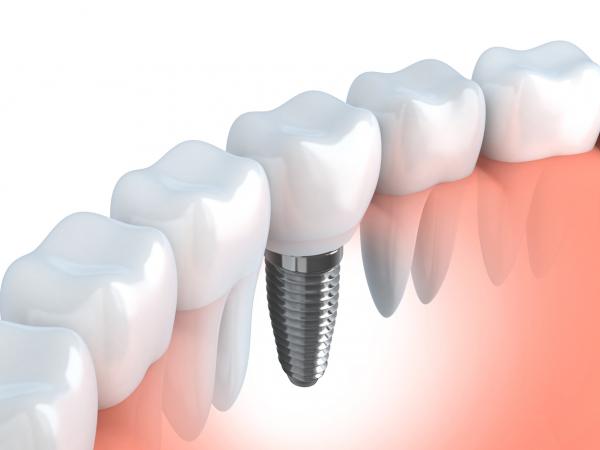
What are Dental Implants?
Dental implants are screw-like structures made out of titanium that are surgically positioned into the jawbone beneath your gums. Implants replace and replicate the function of the root part of your teeth. Once in place, and after allowing sufficient time to let them integrate or fuse to your bone, your dentist can prepare and mount replacement teeth onto them. Your new tooth or crown will be made by a dental laboratory or at your dentist’s office with a custom fit, look and feel to match your natural teeth.
If an endodontic procedure can’t save your tooth and it must be extracted, you should consider a dental implant that will enable you to bite and chew properly, keep healthy teeth from shifting, and help you maintain a natural appearance. Dental implants are widely considered to be one of the most successful methods of tooth replacement used today.
How do Dental Implants Work?
Dental implants heal through a process called “osseointegration” which means to fuse to your jawbone. They provide stable support for artificial teeth. Dentures and bridges mounted to implants won’t slip or shift in your mouth — an especially important benefit when eating and speaking. This secure fit helps the dentures and bridges — as well as individual crowns placed over implants — feel more natural than conventional bridges or dentures.
For some people, ordinary bridges and dentures are simply not comfortable or even possible, due to sore spots, poor ridges or gagging. In addition, ordinary bridges must be attached to teeth on either side of the space left by the missing tooth. An advantage of implants is that no adjacent teeth need to be prepared or ground down to hold your new replacement tooth/teeth in place.
To be a good candidate for dental implants, you need to have healthy gums and adequate bone quantity and density to support the implant. You must also commit to keeping these structures healthy. Meticulous oral hygiene and regular dental visits are critical to the long-term success of dental implants. Uncontrolled diabetes, immunologic disease and smoking can compromise the healing of implants.
What are the advantages of dental implants?
- A healthy, natural-looking smile. Many dental restorations supported by dental implants look and feel like natural teeth. Their color, shape and contours mimic those of natural teeth.
- Renewed eating and speaking. Dental implants can return functionality. Foods that were difficult to eat can be put back on the menu. Speaking clearly can become easier.
- Neighboring teeth are left untouched. Unlike alternative treatments, dental implants do not use neighboring teeth for support, but rather add to the compromised structural support. Therefore, they can improve your overall oral health and help maintain a youthful appearance.
- Stable and comfortable fit. A dental implant is fixed in your jawbone, making it stable and more comfortable than other restorations. It is made of biocompatible materials, meaning your body will easily accept it.
- A new tooth from day one. Depending on your individual situation, your dentist can provide you with a crown at the time of the dental implant surgery, giving you immediate functionality.
- Long-lasting and proven solutions. Dental implant solutions are very durable and easy to maintain. With proper care and good oral hygiene, your new dental implant will last many years — even your entire lifetime.
Carefully discuss your options for treatment with your dental team to ensure you pick the treatment that is best for your overall health. CONTACT US with any questions!

